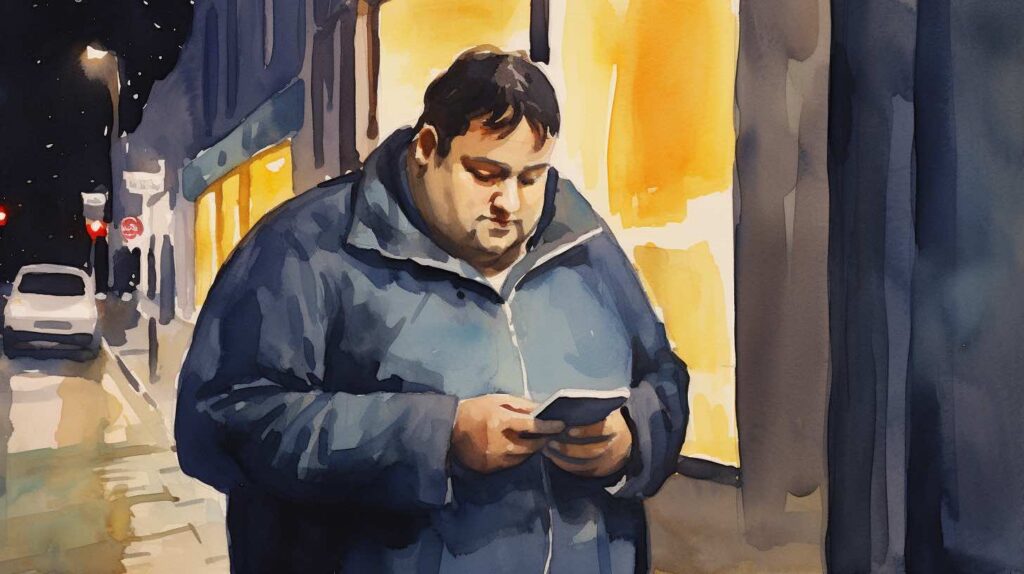Introduction
Hello there! I’m excited to talk to you about something that’s been making a big difference in people’s lives lately: OCD.app. Think of it as a friendly tool in your journey towards mental wellness. You might be wondering, what’s so special about this app? Well, it’s designed to help you understand and reshape those tricky thought patterns that sometimes hold us back from living our best lives.
We all have those days where our thoughts seem to work against us, don’t we? It’s like a record stuck on a negative loop, playing the same unhelpful thoughts over and over. OCD.app steps in to change that tune. It’s not just about managing Obsessive-Compulsive Disorder – it’s about improving our overall mental health by transforming the way we think.
— Gur Ilany, OCD.app co-creator
Understanding Maladaptive Thinking and its Impact
Let’s start by understanding what we mean by “maladaptive thinking.” Imagine your brain as a garden. Maladaptive thoughts are like weeds that can overrun this garden if not managed. They’re patterns of thinking that might have served a purpose at some point but are now more harmful than helpful. They can make us feel stuck, anxious, or unhappy without us even realizing why.
One common example is the inability to believe in change. It’s like telling yourself, “This is how I am, and I can’t do anything about it.” Another is attachment anxiety – constantly worrying about relationships and what others think of us. These thought patterns can sneak up on us and shape our daily experiences in ways we don’t always like.
OCD.app specifically targets these kinds of thoughts. It’s like having a personalized gardener for your brain, helping you identify those weeds and replace them with healthier, more helpful plants. By recognizing and understanding these maladaptive thoughts, we can start taking steps to challenge and change them, leading to a more positive and fulfilling life.
In the next sections, we’ll dive into how the app uses tools like the OCD Quiz, Cognitive Behavioral Therapy, and daily habit formation to transform these challenging thought patterns into something that supports and enriches your life. Stay tuned!

Role of OCD Quiz Assessments
Diving into the heart of OCD.app, let’s talk about its quiz assessments. These are not just any quizzes; they’re carefully crafted tools designed to pinpoint the specific thought patterns or themes that might be causing trouble in your life. It’s like having a map that shows you where the ‘weeds’ are in your mental garden.
The Essence of Quiz Assessments
The OCD Quiz is akin to well-known mental health measures such as the GAD-7 (General Anxiety Disorder-7), PHQ-9 (Patient Health Questionnaire-9), OCI-R (Obsessive-Compulsive Inventory-Revised), and OCI-4 (a short version of OCI-R). These assessments have been widely used in clinical settings to understand and measure the severity of anxiety, depression, and obsessive-compulsive tendencies.
Personalized Understanding
What makes the OCD Quiz stand out is its long-term validation and research. By asking specific, targeted questions, the quiz zeroes in on the unique aspects of your experience. This personalized understanding is crucial because it informs the kind of support and exercises the app will suggest for you.
Examples of Quiz Questions
Imagine questions like those in the GAD-7, which assesses anxiety by asking about your worry levels, or the PHQ-9, which delves into depression symptoms. The OCD Quiz might ask how often you find yourself stuck in repetitive thoughts or feel compelled to perform certain rituals to ease anxiety. These questions are designed to illuminate the patterns of thinking and behavior that are specific to OCD and related disorders.
Insights from the Quiz
The insights you gain from these quizzes are powerful. Just like the OCI-R, which helps individuals and clinicians understand the various dimensions of OCD, the OCD Quiz in the app helps you pinpoint areas like checking, washing, ordering, or obsessing. Recognizing these patterns is the first step towards addressing them.
Setting the Stage for Change
Once you’ve completed the quiz, the app uses your responses to tailor its approach to your needs. This personalized touch sets the stage for more effective change. It’s not just about identifying what’s going wrong; it’s about building a clear path to better mental health.
In the next section, we’ll explore how Cognitive Behavioral Therapy (CBT), a cornerstone of modern psychological treatment, is integrated into the app to help you transform these insights into real change. Stay tuned for an empowering journey!

Cognitive Behavioral Therapy (CBT) and Its Application in OCD.app
What does CBT look like in a Game-like Experience
In this section, we’ll explore how Cognitive Behavioral Therapy (CBT), a well-established therapeutic approach, is woven into the fabric of OCD.app through engaging game-like experiences. These interactive elements not only make the process more enjoyable but also significantly enhance engagement and learning.
The Power of Gamification in Therapy
Gamification in mental health apps is like turning therapy into an interactive journey. By incorporating game elements, the app makes the challenging process of changing thought patterns feel more like a series of achievable, even enjoyable, missions. This approach is known to increase motivation, sustain attention, and enhance the overall experience of therapy.
Embracing, Discarding, and Interacting with Thoughts
One of the key strategies in CBT is learning to identify, understand, and reshape our thought processes. OCD.app transforms this into a tangible experience. Imagine a game where you’re presented with various common thoughts. Your task is to categorize them: which ones to embrace, which ones to discard, and how to interact with each.
- Embracing Thoughts: This involves recognizing and accepting helpful, positive thoughts. It’s like collecting gems in a game – each positive thought you embrace strengthens your mental resilience.
- Discarding Thoughts: Here, you learn to identify and let go of harmful, maladaptive thoughts. Think of it as dodging obstacles in a game. This skill is crucial in reducing your susceptibility to mental health triggers.
- Interacting with Thoughts: This is where you engage with thoughts, challenging and reshaping them. It’s like solving puzzles in a game, developing new perspectives and solutions to old patterns.
Increasing Resilience and Reducing Susceptibility to Triggers
By regularly engaging in these activities, you train your brain much like you would train a muscle. Each interaction increases your mental resilience, making you less susceptible to triggers over time. It’s a gradual process of building mental strength and agility.
Building Long-Lasting Effects
The beauty of gamifying CBT in the app is that it not only helps in the moment but also has a long-lasting impact. These game-like experiences are designed to be memorable and engaging, ensuring that the skills and strategies you learn stick with you, transforming not just your thoughts but your overall approach to challenges in life.
As we move on, we’ll discuss how these tools, combined with the formation of positive daily habits, contribute to a comprehensive strategy for improving mental well-being. Stay tuned for insights into transforming your daily routines into powerful tools for mental health.

The Process of Disengaging from Negative Thinking Loops
Understanding Negative Thinking Loops
In this section, let’s delve into the concept of negative thinking loops. Imagine your mind like a record player, and sometimes, it gets stuck playing a track of unhelpful, negative thoughts over and over. These loops can be about past mistakes, fears about the future, or self-doubt. OCD.app is designed to help you lift the needle off these repetitive tracks and play a more positive tune.
Strategies to Break Free from Negative Cycles

Recognition and Acknowledgment
The first step is recognizing that you’re stuck in a loop. The app helps in identifying these patterns, much like a friend who gently points out when you’re dwelling on the negative.

Disengaging from the negative story
Here, we ask ourselves: What are my negative thinking loop stories? Do I want to engage with them? What are controllable thoughts vs. uncontrollable thoughts?

Challenging Negative Thoughts
Here, the app borrows from CBT techniques. You’ll learn to question and challenge these negative thoughts. Is this thought true? Is there another way to look at this situation?
Building Resilience Against Mental Difficulties
Disengaging from negative loops is more than just stopping a bad thought; it’s about building resilience. Each time you successfully break a loop, you strengthen your mental fortitude. It’s like training a muscle to be stronger against the weight of negative thinking.
The Role of OCD.app in This Process
The app acts as a guide and support system in this journey. With interactive exercises and reminders, it helps keep you on track. It’s like having a personal trainer for your mind, providing tools and encouragement every step of the way.
The Impact of Breaking Negative Loops
Breaking free from these loops can have a transformative effect on your life. It reduces anxiety, lifts mood, and improves overall mental well-being. You’ll find yourself better equipped to handle life’s challenges and less susceptible to being dragged down by negative thought patterns.
Long-Term Benefits
The long-term benefit of this skill is immense. As you practice disengaging from negative loops, you’re not just solving a current problem; you’re equipping yourself with a tool that will serve you throughout life. It’s an investment in your mental health that keeps on giving.
In the next section, we’ll explore how incorporating these strategies into your daily habits can amplify their effectiveness and lead to a more sustained and profound impact on your mental health. Stay tuned for practical tips on transforming your daily life into a nurturing environment for positive thinking!

The Influence of Daily Habits on Thinking Patterns
Linking Daily Habits and Mental Health
Now, let’s focus on how our daily habits can profoundly influence our thinking patterns. It’s a bit like gardening; the daily care we give to our plants determines their health and growth. Similarly, our daily routines can either nurture positive thinking or reinforce negative loops.
How OCD.app Encourages Positive Daily Routines

Routine Building Exercises & Games
The app includes features that help you build and maintain healthy routines. This could be as simple as setting aside time for thinking exercise, or engaging in a short game. These activities serve as easy to use thought pattern disruptors.

Exploration, discovery and Reflection
Here, we ask ourselves: What are my main negative thinking themes? Do I want to work on them daily? Do I want to learn about more patterns I am not aware of?

Consistency & Accountability
Keeping a consistent schedule is key. OCD.app provides reminders and tracking tools to help you maintain your daily habits, ensuring that they become a natural part of your life.
Transforming Thinking Habits
By consistently engaging in positive activities, you slowly reshape your thinking habits. It’s not an overnight change, but a gradual process where positive actions start to influence your thoughts and feelings. Over time, these new, healthier habits become your brain’s go-to response, replacing old, negative patterns.
Reducing Reactivity to Triggers
A major benefit of these healthy habits is a reduced reactivity to triggers. When your baseline of mental health is strengthened by positive daily routines, you’re less likely to be thrown off balance by stressful situations. You develop a resilience that acts as a buffer against life’s challenges.
Building Lasting Mental Health Effects
The long-term effects of integrating positive habits into your daily life are profound. You’re essentially training your brain to favor positive thinking patterns, which leads to improved mental health and overall well-being. The changes you make today have the potential to benefit you for years to come.
In our next section, we’ll discuss the specific role of OCD.app in building these supportive thinking patterns and making healthy thinking more accessible to your brain. Stay tuned for insights on how technology can be a powerful ally in your mental health journey!

OCD.app’s Contribution to Building Supportive Thinking Patterns
In this section, let’s explore how OCD.app specifically aids in developing supportive and healthy thinking patterns, making positive mental habits more accessible and habitual.
Tools for Building Healthy Thinking Patterns through Interactive Games
OCD.app creatively employs a series of interactive games designed to reinforce supportive thinking patterns. These games turn the process of reshaping thoughts into an engaging and enjoyable activity. Let’s explore four of these games:
- Card Selection Game – ‘Choose the Supportive Thought’
- In this game, users are presented with two cards, each displaying a different thought. One is a supportive, positive thought, and the other is less helpful. The challenge is to select the supportive thought. This exercise sharpens the ability to distinguish between helpful and unhelpful thought patterns, reinforcing the practice of choosing positivity.
- Embrace/Discard Game – ‘Swipe Your Thoughts’
- Here, thoughts appear on the screen, and the user must swipe them up to embrace or down to discard, based on their helpfulness. This game mirrors the process of accepting positive thoughts and letting go of negative ones, a crucial skill in managing mental wellness. It’s a simple yet effective way to practice categorizing thoughts in real time.
- Memory Game – ‘Recall the Positives’
- In this engaging memory game, users are shown a series of helpful thoughts. The goal is to remember which positive thoughts appeared in the last round. This exercise not only boosts memory skills but also reinforces the recall of positive, supportive thoughts, subtly embedding them into the user’s cognitive framework.
- Completion Game – ‘Finish the Story Positively’
- This creative game presents users with short, unfinished stories. The task is to choose a word that positively completes the story. It encourages users to think creatively and optimistically, guiding them towards constructing narratives that end on a hopeful or positive note.
By incorporating these gamified exercises, OCD.app makes the process of building supportive thinking patterns more accessible, engaging, and effective. The games offer a fun way to practice and internalize skills that contribute to long-term mental resilience and positivity.
Making Healthy Thinking More Accessible
- User-Friendly Interface: The app’s design is key to its effectiveness. A simple, intuitive interface encourages regular use, making these healthy practices part of everyday life.
- Customized Notifications: Custom reminders can nudge users to engage in healthy thinking practices at times when they might typically encounter stress or negative thoughts.
Interaction with Common Thoughts
- Categorizing Thoughts: Users can learn to categorize thoughts as helpful or unhelpful, and the app guides them on how to respond to each category. This active engagement with their thought patterns is crucial in building resilience.
- Challenge and Replace: The app guides users through the process of challenging negative thoughts and replacing them with more constructive ones, akin to a mental workout that strengthens positive thinking muscles.
Long-Lasting Impact on Mental Well-being
- Progress Tracking: By tracking progress over time, users can see tangible evidence of how their thinking patterns have shifted, which is incredibly motivating and affirming.
- Community Support: Features like community forums or chat groups allow users to share experiences and tips, fostering a sense of belonging and collective progress.
By integrating these tools and techniques, OCD.app plays a vital role in transforming occasional positive thoughts into a consistent, healthy thinking pattern. In the next section, we’ll share real-life success stories and examples to demonstrate how the app’s approach translates into practical, everyday improvements in mental health. Stay tuned for inspiring transformations!

Real-Life Success Stories and Examples
In this section, we’ll dive into some heartwarming success stories and examples from users of OCD.app. These stories not only showcase the app’s effectiveness but also serve as a source of inspiration and hope for others embarking on their journey to better mental health.
Transformative Journeys
Alex’s Story – Overcoming Attachment Anxiety
- Alex struggled with attachment anxiety, constantly worrying about his relationships. Through OCD.app’s thought exercises and embrace/discard game, he learned to recognize and let go of unhelpful thoughts. He now feels more secure and less anxious in his relationships.
Samantha’s Breakthrough – Conquering Negative Loops
- Samantha was caught in negative thinking loops about her career. The memory game and supportive thought selection exercises helped her reshape these patterns. She reports feeling more confident and optimistic about her professional future.
Building Resilience
Tibo’s Experience – Enhancing Daily Habits
- Tibo used the app’s daily routine-building features to incorporate exercise and mindfulness into his day. This change significantly improved his mood and helped him manage stress better.
Maria’s Achievement – Gaining Control Over OCD Symptoms
- Maria found the card selection game particularly helpful in managing her OCD symptoms. By consistently practicing choosing supportive thoughts, she gained much more control over her obsessive thought patterns.
Community Impact
The Power of Shared Experiences
- Many users express how the community aspect of the app, through forums and chat groups, has provided them with a sense of belonging and understanding. Sharing experiences and tips with others has been invaluable in their journey.
Collective Growth and Learning
- User feedback has led to the continuous improvement of the app, showing how collective experiences can enhance the tool’s effectiveness for everyone.
The Ripple Effect
The impact of these individual stories extends beyond the users themselves. Friends and family often notice the positive changes, leading to improved relationships and overall well-being. These success stories illustrate not just the overcoming of challenges but also the ripple effect of positive mental health practices in one’s life.
In our concluding section, we’ll summarize the transformative power of OCD.app and its role in promoting mental wellness and resilience. Stay tuned for final thoughts on how this innovative tool can be a part of your journey to a healthier, happier mind.

Conclusion
As we wrap up our exploration of OCD.app and its transformative role in mental health, let’s reflect on the journey we’ve taken through its features, exercises, and the real-life impact it has had on its users.
The Transformative Power of OCD.app
OCD.app stands out not just as a tool for managing specific mental health challenges, but as a comprehensive companion in the journey towards overall mental wellness. Through its interactive games, personalized assessments, and daily habit-building exercises, it offers a unique blend of support, education, and empowerment.
A New Approach to Mental Health
- Embracing Technology: This app exemplifies how technology can be harnessed for positive mental health outcomes. By integrating principles of cognitive-behavioral therapy into engaging and accessible formats, it breaks down barriers to effective mental health care.
- Personalized and Adaptive: The app’s ability to adapt to individual needs and provide tailored feedback is a game-changer. It ensures that each user’s journey is as unique as their challenges and goals.
Encouraging Self-Empowerment
The stories we’ve shared demonstrate more than just the app’s functionality; they highlight the power of self-empowerment in mental health. Users learn to take control of their thought patterns, build resilience, and cultivate a mindset that supports growth and well-being.
A Continuous Journey
Mental health is a continuous journey, not a destination. OCD.app is designed to be a reliable companion on this journey, offering support, guidance, and resources every step of the way. Its impact is not just in the moment but extends to long-term mental health and well-being.
An Invitation to Explore
For anyone looking to improve their mental health, OCD.app represents a promising avenue. Whether it’s managing specific challenges like OCD or building a more positive outlook on life, this app offers a supportive and effective pathway.
As we conclude, remember that mental health is a vital part of overall well-being. Tools like the OCD.app remind us that with the right support, resilience, and a willingness to engage, each of us has the power to transform our mental landscape for the better. Here’s to your journey towards a healthier, happier mind!
